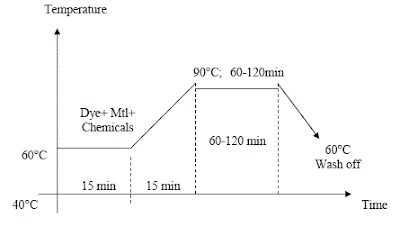The extreme
crystalline nature of polyester fibers creates problems in
obtaining dark shades by conventional dyeing methods even at high
temperature. The carriers
are found to assist the disperse dyes to enter the polyester polymer,
enabling dark shades to be produced. The carriers swell the polyester
fibers, increase inter polymer space and let the dye molecules to enter
the polymer system easily.
RECIPE:
Dye
- For medium shade 0.5-1.5%
- For deep shade>1.5%
- Carrier (phenol) : 3gm/lit
- Acetic acid : 1gm/lit
- Dispersing agent : 2gm/lit
- Salt (NH4)2SO4 : 1-2gm/lit
- pH :4-5.5
- M:L : 1:10
- Time : 60 min
- Temperature : 90°C
PROCEDURE:
- At first, a paste of dye and dispersing agent is prepared and then water is added to it.
- Dye bath is kept at 60°C temperature and all the chemicals along with the material are added to it. Then the bath is kept for 15 min without raising the temperature.
- pH of bath is controlled by acetic acid at 4-5.5.
- Now temperature of dye bath is raised to 90°C and at that temperature the bath is kept for 60 min.
- Then temperature is lowered to 60°C and resist and reduction cleaning is done if required. Reduction cleaning is done only to improve the wash fastness.
- Material is again rinsed well after reduction cleaning and then dried.
Advantage of carrier dyeing
- In conventional dyeing method, the extremely crystalline polyester fabric cannot be dyed in deep shade. But by using carrier we can get medium to dark shade in boiling temperature.
- Moderate level dyeing in polyester dyeing
- Increased rate of dyeing
- Increased leveling
- Improves fastness properties of fabric except light fastness
Disadvantage of carrier dyeing
- More costly
- Decreased light fastness
- Carriers are unhygienic and toxic
- Odor and air pollution problem
- Some can cause carrier spot

0 comments:
Post a Comment
Your comments are always appreciate. Don't hesitate to do a comment & express your voice.